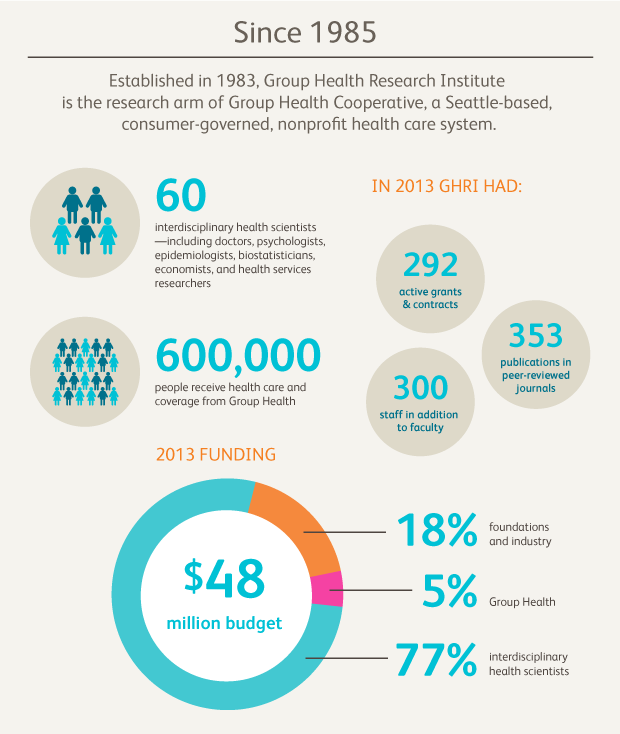3 decades on: How Group Health’s practical research changed health care

When we say that Group Health Research Institute (GHRI) does practical research to help people like you and your family stay healthy, what do we mean? The short answer: We study what works—and what doesn't—to achieve the most important outcome for people everywhere: good health. And as of October, we’ve been doing it for 30 years.
How? Through our learning health system and our connection to Group Health Physicians and other providers, we put our findings into practice quickly—so Group Health patients, clinicians, and administrators reap the benefits. But the advantages of our research also reach much further. By figuring out practical ways to make health care more effective and efficient, we make it possible for more people around the country and the world to stay healthy and get the care they need.
So as we celebrate 30 years—and look forward to 30 more—let’s explore a few examples of how Group Health’s practical research has made a difference—and keeps breaking new ground:
Improving everyday health care
The Chronic Care Model we developed and disseminated has been adopted by health care organizations across the nation (such as the Mayo Clinic) and worldwide (including the World Health Organization). As the Model spread, it improved care for countless people with chronic illnesses including heart disease, diabetes, asthma, and depression. Recent contributions include: spreading the Model to safety-net clinics, learning from high-quality practices, and providing nurse navigators to patients recently diagnosed with cancer. Meanwhile, our research on the patient-centered medical home is transforming health care nationwide, and we’re studying accountable care organizations (ACOs), which the Affordable Care Act promotes.
Patient safety
GHRI research spurred Group Health’s efforts to improve the safety of CT scans and opioid prescribing—the latter of which helped inform the federal government’s plan to curb a nationwide epidemic of prescription drug abuse and overdose. Breast cancer researchers look for ways to minimize false positives through risk-based screening, including biennial mammograms for many women. GHRI is also partnering with the U.S. Food and Drug Administration (FDA), other health plans, and academic institutions on the Sentinel Initiative for routine, proactive monitoring of medical products’ safety. And we help protect the public from infectious diseases through the nationwide network of Vaccine and Treatment Evaluation Units.
Mental health
Group Health research has helped make care for mental health more accessible by showing the effectiveness of phone-based and online care for depression; depression care programs through employers; and TEAMcare for people with depression and diabetes, heart disease, or both. We discovered how to increase the chances of recovery from depression through collaborative care—changes being made across the country and adopted as national standards in other countries. Next up: testing collaborative care for alcohol use disorders as well as practical tools to prevent suicide.
Shared decision making
Part of patient safety involves ensuring that people receive the care that they want and need—not more, or less. Our research on shared decision making for treatments such as joint replacement surgery has shown that well-informed patients tend to choose safer and often less costly care. Receiving information about different treatments’ risks and benefits helps patients clarify their values, weigh their options, and choose the best course for them, in consultation with their clinicians.
Quitting smoking
Thanks to our longstanding tobacco cessation research program, effective phone-based quit-smoking counseling spread first to all Group Health members and then to states nationwide, thanks to tobacco settlement funding. After launching as a separate for-profit company, Free & Clear® (now called Alere Wellbeing) became the leading U.S. provider of tobacco quitline services, used by millions of Americans. Insurance coverage for smoking cessation is now a national standard. And the practical results keep coming—including an effective and cost-effective combination of Web- and phone-based counseling (now standard care at Alere Wellbeing).
Health information technology
With secure messaging on Group Health’s patient website MyGroupHealth, GHRI researchers are studying practical ways to use patient-centered health information technology to engage people in improving their health—helping them control hypertension and get colon cancer screening. We’re also evaluating Mobile MyGroupHealth and using natural language processing to increase the efficiency of research itself.
We live in an era where health care is truly transforming—and we are poised to study these changes and innovations as they happen. Our practical research will continue leading the way to better health—for the next 30 years and beyond.


